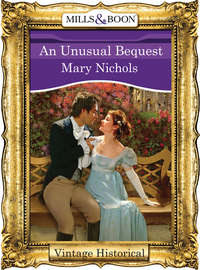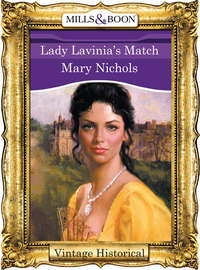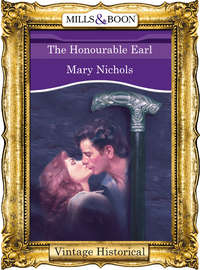
Полная версия
Marrying Miss Hemingford
It was very early when she woke, and unable to stay in bed, she rose and dressed and went downstairs to find the maid preparing breakfast. ‘Mrs Bartrum instructed me to take breakfast to your rooms,’ she said. ‘I didn’t expect you down…’
She was obviously flustered and Anne smiled to put her at her ease. ‘Oh, do not mind me, I like to be up be-times. Take my aunt’s and Miss Parker’s up to her. I’ll have mine in the morning room, then I think I will take a stroll.’
She had long ago stopped worrying about having a chaperon everywhere she went and, half an hour later, she was walking along the sea front. There was a little more wind than there had been the day before, which tipped the waves with white foam, but in spite of this the bathing machines were doing good business.
They reminded Anne of gypsy caravans. They had four large wheels, which elevated them four or five feet from the ground, and were entered by a flight of steps at the back that had a kind of canvas hood. Once the bather was inside, she changed into the costume given to her by the attendant and the horse drew the whole contraption into the water where the vehicle was turned round, so that the bather could descend the steps straight into the sea, still under the shelter of the hood. Thus the proprieties were observed and none of the lady’s fine clothes were even dampened. Even at a distance Anne could hear the women’s shrieks as they immersed themselves. Further along the beach the same service was being offered to gentlemen bathers.
She carried on to The Steine, noticing that the fishermen’s nets and the boats had gone. There were sails on the horizon, but she could not tell what kind of boats they were, nor if they were coming in to land. Behind her the road was becoming busy; there were carriages and carts going about their business and pedlars setting up their stalls. What alerted her she could not afterwards say, but she turned suddenly to see a fast-moving curricle mount the walkway and clip a small child, sending her sprawling. Anne was running almost before the little one hit the cobbles. The curricle, driven by an army officer, went on without stopping.
The child could not have been more than five years old. She wore a flimsy cotton dress and very little else, no shoes, no coat. Anne fell on her knees beside her. She was unconscious and was bleeding from a wound to her head. Anne’s first fear that she might have been killed gave way to relief when she saw the slight chest moving. She looked around as if expecting help to materialise but though a crowd had gathered, no one seemed particularly helpful. ‘Does anyone know where she lives?’ she asked.
‘Take her to the poorhouse infirmary,’ said one. She could tell by his clothes that he was one of the gentry; he had a fashionable lady on his arm who shuddered in distaste and pulled him away. He went meekly, leaving Anne fuming.
‘There’s a doctor nearby,’ a young lad said, pointing towards an alley between tall narrow buildings. ‘You’ll know ’is place by the brass plate on the door.’
Anne scooped the child up in her arms and, supporting her head with one hand, hurried in the direction of the pointing finger. The little one, being half-starved, was light as a feather. ‘You will be fine,’ she murmured, hugging the child to her, though she was filthy and smelled of stale fish and her blood was seeping into Anne’s clothes. ‘The doctor will make you better and then I’ll take you home to your mama. Where do you live?’ She received no reply because the child was still deeply unconscious.
The alley was so narrow the sun could not penetrate it and there was hardly room for two people to walk side by side, but she was aware that the lad who had given her directions was pounding just in front of her. ‘Here it is, miss,’ he said, stopping beside a door on which was a painted notice announcing Dr J. Tremayne. Anne had her hands full and so he banged on the door for her with his fist.
It was opened by a plump woman in a huge white apron who immediately took in the situation. ‘Bring her in, bring her in,’ she said.
Anne followed with her burden as she was led along a corridor and into a room that was lined with benches and chairs, but no other furniture. In spite of the early hour, there were people waiting, old, young, crippled, deformed, all poorly clad, all grubby. She was about to sink into one of the chairs, when the woman said. ‘Better bring her straight through.’
She ushered Anne into an adjoining room, which was evidently the doctor’s surgery, for there was a bed, a desk with a lamp on it, two chairs and a large cupboard, most of it extremely shabby though perfectly clean. Of the doctor there was no sign.
‘Put her on the bed. I’ll fetch Dr Tremayne. He’s having his breakfast before he starts. They all come so early and he’d come straight from his bed if I didn’t insist he had something to eat and drink first.’
She disappeared and Anne gently laid the child on the couch. She was trying to staunch the bleeding with a towel she had taken from a hook on the wall, worrying that the little girl was so pale and lifeless, when she heard the door open and close behind her and turned to face the man who had entered.
She had expected a middle-aged man with thinning hair and a rumpled suit. What she saw was the most handsome man she had seen in a long time. He was older than she was by a year or two, tall and spare, with thick dark hair, much in need of a barber, and a tanned, almost rugged complexion. She might have been right about the crumpled suit, except that he wore no coat and was in his shirt sleeves. Nothing could have been further from the dandies who strolled in and out of London drawing rooms during the Season than this man. In spite of a slight limp he exuded masculine strength, and she felt her breath catch in her throat.
He barely glanced at her as he went over to the child and began examining her with gently probing fingers. Anne wondered whether she was expected to go or stay, but her heart had gone out to the little scrap of humanity and she wished she could do something to help. She hesitated. ‘Will she be all right?’
‘Let us hope so.’ He still had his back to her and clicked his fingers at the plump woman who had followed him into the room. ‘Padding and a bandage, Mrs Armistead, if you please.’ These were put into his hand and he carefully bandaged the head wound and put some ointment on the grazed arm and leg, ignoring his audience. When she saw the child’s eyelids flutter, Anne breathed an audible sigh of relief.
‘You may sigh,’ he said sharply, proving he had been aware that she had stayed. ‘What were you thinking of to allow a child so small to run out alone? Have you no sense at all?’
Anne was taken aback until she realised that he had mistaken her for the child’s mother, which just showed how unobservant he was. The little girl was in dirty rags whereas she was wearing a fashionable walking dress of green taffeta, a three-quarter-length pelisse and a bonnet that had cost all of three guineas. The thought of that extravagance in the face of this poverty made her uncomfortable. She looked at Mrs Armistead, who lifted her shoulders in a shrug.
‘I am not the child’s mother,’ she said, and suddenly wished she was. She could dress her in warm clothes, give her good food, care for her as her mother evidently did not. ‘I never saw the child before today.’
‘Oh.’ Alerted by her cultured voice, he turned from his ministrations to look at her for the first time and she saw deep-set brown eyes that had fine lines running from the outer corners as if he were used to squinting in strong sunlight, but the eyes themselves were cold and empty and his expression severe. She smiled, trying to evince some response from him.
‘Madam.’ He bowed stiffly, hiding the fact that he had been taken by surprise. What he saw was not only a tall graceful woman of fashion, but also an oval face of classic proportions, narrow though determined chin, wide cheeks, broad brow, and lovely amber eyes full of tender concern. He held her look for several seconds, battling with his anger over the neglect of the child and his natural inclination to blame the woman who had brought her to him. She was obviously one of the fashionable set that had taken over Brighton, destroying the fishermen’s cottages to build their grand villas, relegating the poorer inhabitants to dismal tenements in the murky, malodorous back lanes. There was still a fishing trade in Brighton, but it was dwindling in the face of the onslaught of the rich who wanted service more than fish. On the other hand she had cared enough to soil her clothes and bring the child to him. ‘I beg your pardon for my error.’
‘I was walking along the promenade when I saw her knocked down by a furiously driven curricle,’ Anne explained. ‘The driver was apparently unconcerned, for he did not stop. I was advised to bring her here.’ This explanation was given in a breathless voice, quite unlike her usual self-assured manner, though why he should have such a profound effect on her, she did not know. It was not like her to feel the need to justify her actions.
‘It is as well you did.’ He straightened up and went to wash his hands in the bowl placed on a side table. ‘She might have bled to death.’
The child began to whimper and Anne fell on her knees beside the bed and took her bony little hands in her own. ‘Don’t cry, little one. You are safe now.’
‘Me ’ead hurts.’
‘I know, dear. The doctor has given you a lovely white turban to make it better. What do you think of that?’
‘Ma, where’s Ma? And Tom. Tom…’ She was becoming distressed and tried to rise.
Anne pressed her gently back on the pillow. ‘Lie still, little one. We’ll fetch them for you.’ She looked up at the doctor who was washing his hands in a tin bowl. ‘Do you know who she is?’
‘No, but undoubtedly someone will come looking for her.’ He knew he was being unfair, but he could not help contrasting the elegance of this woman with the poverty all around him. She was by no means plump, but she wasn’t half-starved as the child was. And she had never had to sit for hours in an uncomfortable waiting room to get treatment for an ailment that would soon be cured if the patient had wholesome food and clean surroundings.
Anne stood up to face him. His abrupt manner was annoying her. She took a firm grip on herself. ‘How can you be so sure?’
‘I am usually the first port of call in this district if anyone is injured or lost.’ He reached for a cloth to dry his hands. ‘Word gets around.’
‘Are you going to keep her here?’
‘I can’t. I have no beds for staying patients. I wish I had, I could fill them a hundred times a day. I shall have to send her to the infirmary unless someone comes quickly to claim her. You may have noticed I have a full waiting room.’
‘What can I do to help?’
He gave a wry smile. ‘I never turn down a donation, madam.’
‘There is that, of course,’ she said, irritated by his manner. ‘But I was thinking of help on a practical level. I could go and look for her mother, if you could give me some idea of where she might be found.’
This produced a chuckle. ‘I think that would be unwise.’
‘Why?’
‘If my guess is correct, it is a slum. Filthy, unsanitary and stinking. You would ruin your fine clothes and heave up your breakfast, neither of which this child has nor ever has had.’
‘Do you take me for a fool?’ she demanded, forbearing to point out that her coat was already ruined. ‘One look at that poor little mite is enough to tell me what kind of home she comes from. But that doesn’t make it any less of a home to her. And it is the child I am concerned with, not my own convenience.’ She stooped to stroke the little one’s tear-wet cheek and her brusque manner softened. ‘Don’t cry, sweetheart, we’ll find your mama. Do you know where she is?’
‘On the beach. With the huts.’
‘She must be a dipper,’ Mrs Armistead said. ‘A bathing attendant.’
‘But surely she does not leave the child alone while she works?’
The woman shrugged. ‘Sometimes it can’t be helped.’
Anne, remembering the little girl had mentioned Tom, turned back to her. ‘Who is Tom?’
‘Me bruvver. He looks arter me.’
‘And where is he?’
‘Dunno.’
Anne fumed against the boy, but kept her anger from her voice. ‘What is your name?’
‘Tildy Smith.’
Anne patted her hand, stood up and addressed the doctor. ‘I am going down to the bathing machines to find her mother. Can you keep her here until I come back? I don’t want the poor little mite to go to the infirmary if it can be helped.’
‘Mrs Armistead will take her to the kitchen. There’s a couch in there, but if her mother does not come for her in an hour, or two at the most, I shall have to send her to the infirmary. If my patients learn that I am making a hospital of my home, they’ll expect the same service and I have to draw the line somewhere.’
He sounded so weary Anne immediately forgot her annoyance and smiled. ‘I’ll have the mother back before that; if I cannot find her, then I will take the child myself.’
‘You?’ The contempt in his voice made her hackles rise.
‘Why not? I found her and brought her here. I feel responsible.’
‘How can that be? You did not run her down, did you?’
‘Indeed I did not! And if I ever find the man who was driving that curricle, I shall tell him exactly what I think of him. He could have killed her.’
‘But he did not. And thanks to you, she will be none the worse in a week or two.’ He was beginning to revise his opinion of her; she truly cared and she might be good for a generous donation; that fetching bonnet must have cost a pretty penny. Better not antagonise her. ‘My name is Tremayne, by the way.’
‘Yes, I noticed it on the plate by the door,’ she said, wondering what the initial stood for. ‘I am Anne Hemingford.’
‘How d’ you do, Lady…?’ His pause was a question.
She smiled, offering her hand. ‘Miss Hemingford.’ She could have said the Honourable Miss Anne Hemingford, but decided against it. He already thought she was too big for her neat kid boots.
He shook her hand and watched her as she strode purposefully from the room, wondering if he would ever see her again. Women of quality, as she so obviously was, often sympathised with his aims, professed themselves interested in his work and even came to look round, but when they saw the patients he attracted—the poor, the lame, those misshapen by hard work and an inadequate diet, filthy because sanitation in their tenements was unheard of—they soon lost interest. He didn’t care; he was grateful if they made a donation that might allow him to pay the rent for a week or two longer and buy a few more medicines, before they disappeared off the scene. Was Miss Hemingford any different?
Her look of tender concern had been genuine enough, but it had been mixed with a steely determination that made him smile. Perhaps that was the clue to why she had not married; she was too dictatorial. But did she have any idea of what she was at? If she came back herself instead of simply sending Tildy’s mother, then he would know she was sincere. For the first time he became aware of his stained shirt and untidy hair. He never seemed to have time to visit the barber and though he changed his shirt every day, it was soon grubby again. He promised himself to make time to have his hair cut.
Anne hurried through the waiting room, more crowded than ever, and out into the narrow lane, breathing deeply. It was not only the strange smells: a mixture of blood, sweat, putrefaction and harsh soap, which had been overpowering, but the whole atmosphere of the place and the demeanour of the man who ran it. He had had a powerful effect on her. Not since she was a seventeen-year-old had any man made her shake like she was shaking now, with embarrassment that he might have detected it, with anger that he could be so cool towards her and with the feeling that she was being pitched into something over which she had no control. And that had not happened in a very long time. She had always been in control of herself, her life, even of her grandfather and he was an earl, so why should a tiny little girl and a strange man take that away?
If she had met him in someone’s upper-class drawing room, dressed in pantaloons and morning coat with pristine starched cravat and his hair carefully coiffured, she would have taken him for a gentleman. He was educated and self-assured, but at the same time he seemed oblivious of his good looks and certainly unconcerned about his clothes. His cravat was unstarched and was nothing but a simple knot and his shirt was spotted with blood. It was evident his work was the most important thing in his life. Was he married, she wondered, and how could a wife compete with such dedication?
Back on the sea front, it took only a few minutes to find some steps down to the beach, where she picked her way over the shingle to where the bathing huts were lined up. Many of the contraptions were already in the water, but Anne approached the first one on the sands. ‘I am looking for Mrs Smith,’ she told the attendant.
‘We take it in turns, ma’am,’ she was told. ‘’Tis fairer that way. If you want to take a dip…’
‘No, you misunderstand. I am looking for Mrs Smith, the mother of little Tildy. Her daughter has been involved in an accident…’
‘Oh, tha’s different.’ She looked over the water to one where one of the women stood waiting to help her customer back into the hut. ‘Martha, this ’ere lady says your Tildy’s met with an accident.’ Her voice easily carried and the woman hurried out, holding her arms above the surf as she waded back to dry land.
‘What’s ’appened to ’er, what’s ’appened to my Tildy?’ she demanded breathlessly. ‘Where is she?’
Almost before Anne had finished explaining what had happened, Mrs Smith had asked her colleague to see to her customer and was off up the beach to the promenade with Anne at her heels. She burst breathlessly into the waiting room where Mrs Armistead was conducting the next patient into the surgery. ‘Where’s my little girl? Where’s Tildy?’
Mrs Armistead pointed along the corridor and the distraught woman rushed off to the back region of the house, still followed by Anne.
Tildy was lying on the couch playing with a rag doll. A little colour had returned, but the white bandage made her head look enormous. Mrs Smith rushed over and fell to her knees beside her. ‘Tildy, Tildy, what ’ave you bin up to now?’ She leaned back to look at the little girl. ‘I’ll whip that Tom within an inch of ’is life, so I will.’
‘Weren’t ’is fault, Ma. Pa fetched ’im.’
‘Why? Your pa knows Tom ’as to mind you. And even if he left you, you should ’ave stayed at ’ome.’
‘I know, but ’e said they’d caught a monster and I wanted to see it.’ Catching sight of Anne, she smiled. ‘’Allo, lady. Ma, tha’s the lady what picked me up.’
Mrs Smith turned to Anne, who realised she had misjudged the woman; she evidently cared very deeply about her child. She was, Anne realised, young, younger than Anne herself, and thin as a reed. Once she had been beautiful, but the hard life she led, out on the beach, prey to wind and salt spray, had darkened and coarsened her complexion. But her eyes were a brilliant blue. ‘I thank you, ma’am, with all me ’eart.’
‘Think nothing of it. Do you think you can manage? I mean, you do not think Tildy should go to hospital?’
‘No, I don’t. People who go in there, come out with more trouble than they went in with, if they come out at all. I’ll look after her.’
‘But don’t you have to go to work?’
‘Tildy is more important. We shall just ’ave to ’ope her pa finds the shoals until she’s well enough.’
‘He’s a fisherman?’
‘Yes.’
Anne fished in her reticule and found a guinea and some small change. ‘Will this help?’
‘Only if you want to buy fish with it. I don’t tek charity.’
‘No, of course not. Very well, sell me fish; lobsters and crabs and anything else that’s going. And if there’s change, I’ll take a dip in the sea and so will my aunt.’
‘I should give you the fish for your help, not sell it,’ the woman said doubtfully.
Tildy had been listening to this and could not keep quiet a moment longer. ‘She could buy the monster.’
Anne laughed. ‘I don’t think I should know how to cook a monster.’
She turned as Dr Tremayne came into the room, rather like a whirlwind, all blow and hurry, his hair in more disarray than ever, but it made no difference, Anne’s heart began to jump in her throat and it was all she could do to maintain an outward show of composure.
‘You found her, then?’ he queried.
‘Yes.’ She held his glance, searching his face. His brown eyes told of something she could not quite fathom; it might have been weariness, but it was more than that— sadness or bitterness perhaps. Was it because of the horrors of what he had seen as a doctor, frustration for the ills of the poor people he treated, which one man alone could not cure, or something in his past? Whatever it was made her feel uncomfortable, as if she were responsible. ‘I must go, my aunt will be wondering what has become of me, I only meant to be out an hour or so.’ She paused. ‘I shall arrange to make a donation as soon as I can.’
‘Thank you.’ He did not know what else to say. He had misjudged her, but what did it matter if he had? He was merely a physician struggling against the odds in the poorest part of the community and she was a woman of means, that was obvious. Once he might have been her equal, not any more.
‘Where shall the fish be sent?’ Mrs Smith asked.
Anne gave her the address, wondering what cook would say when she was presented with a week’s supply of fish all at once. She could not remember if her aunt was fond of fish, though they had both enjoyed the turbot the night before. She turned to Tildy. ‘Goodbye, Tildy. Be a good girl now, and when you are better, perhaps your mama will bring you to see me.’ She kissed the child’s forehead, smiled at Mrs Smith, who tried to thank her, then held out her hand to the doctor. ‘Goodbye, Dr Tremayne. I shall tell my friends of your good work. It deserves to be recognised.’
‘Thank you.’
She retreated hastily before she could let herself down by telling him she hoped they would meet again, which would have been far too bold. She hurried from the house and made her way home as briskly as she could.
Justin Tremayne watched until the door had closed on her, then turned to Mrs Smith. ‘Look after that child, madam. She needs rest and…’ He stopped. What was the good of telling her she also needed good food? ‘Send for me if you have the slightest cause for concern. Head wounds can be funny things. She was lucky Miss Hemingford brought her here so quickly.’
‘I know, sir, I know.’ She opened her palm to show the coins Anne had given her. ‘How much do I owe you?’
‘Nothing,’ he said. ‘You spend that on a good dinner.’
She thanked him and picked up the little girl. He put his finger out to touch the child under the chin and for a moment his eyes softened. ‘Take care.’
‘You’re a fool,’ Mrs Armistead said, as soon as they had gone. ‘You can’t live on air, you know.’
‘Neither can they. And Miss Hemingford has promised a donation, so we can carry on a little longer.’
He only hoped she had meant it. After all, she had promised to return with Tildy’s mother and she had done that and perhaps that meant she was the exception to the rule and was a young lady who kept her word. If and when the donation arrived, he would write and thank her for it, which was only courtesy, after all, and then perhaps… He shook himself and went back to his surgery to call in the next patient.
Chapter Two
‘What am I supposed to do with it?’ Mrs Bartrum asked. She and Anne and the cook were looking in dismay at a box full of mackerel, herring, whitebait, crab and lobster that had been dumped on the kitchen table.
‘I never ordered it,’ Mrs Carter said, in an aggrieved voice. ‘Why would I ask for that amount unless you were going to hold a supper party and you didn’t say anything to me about any such thing, ma’am.’








